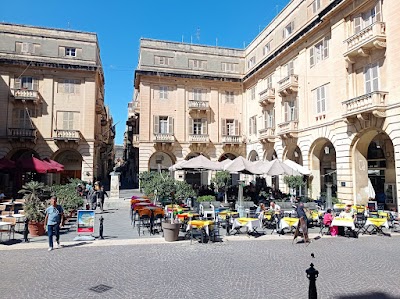Mastering Malta’s Property Tax Landscape: An Investor’s Handbook
Owning property in Malta not only opens up unique investment opportunities for Chinese nationals but also introduces a series of tax implications, particularly in relation to property sales and inheritance. This blog post delves into the tax landscape for Chinese investors in Malta, offering key insights for strategic planning and compliance.

Selling Property in Malta: What Taxes to Expect
Malta’s tax system includes specific regulations for property sales, which vary based on the length of ownership and residency status.

#MaltaRealEstate
Tax Exemption for Long-term Residents
Living in your property as your primary residence for three years or more? You’re in luck—selling your property under these conditions is tax-exempt. This exemption encourages long-term residency in Malta and offers tax relief for those relocating due to personal reasons.
Taxes on Selling Non-primary Residences
For properties not used as a primary residence in the past three years, tax rates are:
- Before January 1, 2004: 10% of the final sale price.
- Within the last five years: 5% of the sale price.
- More than five years after January 1, 2004: 8% of the sale price.
Gifting Property in Malta: A Tax Perspective
Property gifting in Malta, often seen as a means of family inheritance, benefits from favorable tax treatments. When parents gift property to their children, the giver incurs no taxes, easing the financial burden of family property transfers. However, recipients may be liable for stamp duty, with exemptions designed to encourage homeownership among the younger generation.
Exemption for First-time Gifts
For residential properties gifted between parents and children for the first time, the first €200,000 of property value is exempt from stamp duty, supporting first-home acquisitions for children. This exemption requires recipients to certify they do not own any other properties.
Inheriting Property: Tax Regulations
Taxation on inherited properties in Malta varies with the inheritance date:
- Before November 25, 1992: A flat 7% rate of the sale price applies when the property is sold.
- After November 25, 1992: Tax calculations become more complex, involving the difference between the assessed value at the time of death and the actual sale price, with a 12% tax rate on the difference.
For Chinese investors, grasping Malta’s tax regulations is essential to ensure legal compliance and financial optimization of property transactions. Through strategic tax planning and taking advantage of government incentives, investors can significantly lower tax liabilities, enhancing returns as Malta’s economy and real estate market continue to develop.
Discover more about regional differences on Visit Malta’s official tourism site.

More Housing Articles on HubpyMalta:
-
Understanding Property Taxes in Malta: A Guide for Investors
Mastering Malta’s Property Tax Landscape: An Investor’s Handbook Owning property in Malta not only opens up unique investment opportunities for Chinese nationals but also introduces
-
Guide to Finding the Right Rental Property in Malta 2024
Introduction to Malta’s Rental Market Dynamics Introduction Malta, with its rich history, Mediterranean charm, and vibrant expat community, is an attractive destination for many looking
-
Introduction to Malta’s Rental Market Dynamics 2024
Malta’s Rental Market in 2024: An In-Depth Analysis Introduction to Malta’s Evolving Rental Landscape The rental market in Malta is witnessing significant changes, driven by
What’s Hot on HubpyMalta:
- Guide to Finding the Right Rental Property in Malta 2024
- Mediterranean Charms: Malta vs. Cyprus – Choosing Your Island Getaway 🏝️🌞
- Malta: A Mediterranean Shopper’s Paradise 🛍️💎
- Exploring the Best Places to Live in Malta: A Comprehensive Guide 🏡🌴#DiscoverMalta #BestPlacesToLive
- Embracing the Digital Nomad Life: Malta’s Accommodation Proof Requirements Explained 🌍✈️
- Introduction to Malta’s Rental Market Dynamics 2024
- Malta’s Electric Vehicle Incentive: New Government Subsidy Policy Unveiled – 2024
- Embracing Global Tourism with a Focus on China
- Exploring Island Paradises: Madeira vs Malta 🌴🌊
- Green Malta: Digital Menus and E-Commerce Paving the Way to Sustainability 🌿📱
中文版
在马耳他拥有房产:中国投资者的税务指南
#MaltaRealEstate
对中国国民而言,在马耳他拥有房产不仅提供了独特的投资机会,同时也伴随着税务方面的考量,特别是在房产销售和继承方面。本篇博客深入探讨了中国投资者在马耳他面临的税务景观,为战略规划和合规提供了关键洞察。
在马耳他出售房产:预期的税费
马耳他的税务系统针对房产销售制定了特定规则,这些规则根据拥有期限和居住状态的不同而有所变化。
长期居民的税务豁免
如果您的房产是您的主要居所,并且居住时间超过三年,那么您在出售房产时将享受免税待遇。这一豁免旨在鼓励在马耳他的长期居住,并为因个人原因需要搬迁的人提供税务减免。
出售非主要居所的税费
对于过去三年内未作为主要居所使用的房产,税率如下:
- 2004年1月1日之前:最终销售价格的10%。
- 过去五年内购买:销售价格的5%。
- 2004年1月1日之后五年以上购买:销售价格的8%。
在马耳他赠与房产:税务视角
在马耳他,房产赠与被视为家族传承的一种方式,并通过优惠的税务处理鼓励这一行为。当父母将房产赠与子女时,赠与人不需要缴纳任何税费,大大减轻了家庭内房产转移的财务负担。然而,接收者可能需要支付印花税,但为了促进年轻一代的房屋所有权,设有显著的免税优惠。
首次赠与的免税
对于父母与子女之间首次赠与的住宅房产,前€200,000的房产价值免征印花税,支持子女购买首套房屋。这一免税条件要求接收者声明他们没有拥有其他房产。
继承房产:税务规定
继承房产的税务根据继承时间的不同而有所变化:
- 1992年11月25日之前:当房产出售时,适用销售价格的7%的固定税率。
- 1992年11月25日之后继承的房产,涉及根据死者声明的房产价值与销售价格之间的差额进行复杂的税务计算,按12%征税。这确保了税收的公平性,并考虑了房产价值的实际增值。
- 结论
- 理解并遵守马耳他的房产税务规定对于法律和监管遵从至关重要。通过战略规划和利用税收优惠,可以显著减轻税务负担,最大化投资回报。随着马耳他经济的增长和房地产市场的成熟,了解这些税务细节为房产所有者提供了巨大的优势。























